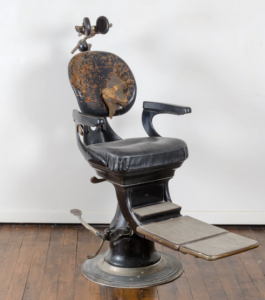 John Updike famously hated giving interviews, but when his Ipswich dentist had his drill in his mouth and asked, “My son would like to interview you for his school paper. Would that be okay?” it’s tough to say no. Impossible, even.
John Updike famously hated giving interviews, but when his Ipswich dentist had his drill in his mouth and asked, “My son would like to interview you for his school paper. Would that be okay?” it’s tough to say no. Impossible, even.
Bob Waite, whose interview—“Column: Updike interview proved drill mightier than the sword (or pen)”—appeared in yesterday’s Ipswich News—recalled that 1965 interview and shared Q&A excerpts he found in a box. Among the questions:
What do you consider your major work up to this time? That is a very difficult question. Of the four novels I have written, each was the best I could do at the time. If I had to pick one it would probably be The Centaur. Of my short stories, my next book, Olinger which will come out next year, is my best.
I have read some of your books and have noticed a lack of endings. Do you have a special reason for using this style? I do not believe in artificial endings. A conventional ending doesn’t fit real life. (But) all of my books are written towards an ending I have in mind. I don’t just chop the end off when I get tired.
Do you find you often unknowingly use actual persons and occurrences in your writing? No. If I do it, I do it knowingly. In general, I try not to translate real things into fiction. But I find it almost unavoidable to refrain from mixing fact with fiction.
A few unkind things were said about your last book, Of the Farm. What is your general opinion of critics? I don’t have a general opinion of critics. It all depends on the critic. Being a critic is a very difficult thing to do well. I think there’s a lot of propaganda going on about books. If a book cannot defend itself, then it cannot be defended.
Do you have any favorite authors or persons who have influenced your writing? Many, beginning with my parents and my wife. As for authors, I would have to say James Thurber, Henry Green, Marcel Proust, James Joyce, Franz Kafka, J.D. Salinger, and Ernest Hemingway all influenced me.
Read the whole interview.
